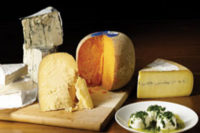Health Trends Among Young Children
New research shows cheese, hotdogs, whole and 2% milk are among the top foods and beverages contributing to saturated fat and sodium intakes of toddlers and preschoolers.

Since milk is key in children's diets and a top contributor of many important nutrients including protein, calcium, vitamins A, D, B12; thiamin and riboflavin, the recommendation is not for parents to limit milk but instead to offer lower fat options such as 1% and skim. Other sources of saturated fat should be limited in the diets of young children.
The new findings are from a recent analysis of the 2008 Nestle Feeding Infants and Toddlers Study (FITS), the largest, most comprehensive dietary intake survey of parents and caregivers of young children.
These insights may have implications for helping address childhood obesity among two- to four-year olds in the United States.
"The first years of a child's life are a critical period of development. Instilling good eating habits during this time can help put a child on the path to a healthy future," said Kathleen Reidy, Ph.D., RD, and head of Nutrition Science, Nestle Infant Nutrition. "Our findings indicate snacks are a significant portion of young children's diets, and families can play an important role by planning nutritious snacks, especially when on-the-go."
Data from the recent FITS analysis shows that while young children are snacking more frequently at home, snacks consumed outside the home add about 50 additional calories to their daily diets.
Drs. Reidy and Denise Deming of Nestle presented two abstracts on the recent analysis of FITS 2008 during the "Nutrition Education: Childhood Obesity Prevention I" symposium at the Experimental Biology 2014 conference.
Reidy, the lead author of an analysis examining top food sources contributing to energy (calories), saturated fat and sodium intake in the diets of toddlers (12-23 months) and preschoolers (24-47 months) found:
- A few foods contribute almost 50% of daily calories -- these include milk, cheese, bread and rolls, ready-to-eat cereals, poultry (chicken and turkey), butter, margarine or other fats.
- Preschoolers are consuming nearly one-third, or about 400, of their total daily calories from solid fats and added sugars.
- Top foods representing 70% of saturated fat intake include milk, cheese, butter, hot dogs/bacon, beef, poultry and cakes/cookies.
- Top foods contributing almost 40% of young children's sodium intake include milk, hot dogs and bacon, chicken/turkey, cheese, bread and rolls, crackers and ready-to-eat cereals. This intake equates to a child (24-47 months) consuming an average of 1,863mg of sodium per day.
The new findings complement previously released research from FITS which showed 45% of toddlers and 78% of preschoolers consume more sodium than recommended.
Deming analyzed dietary intake surveys for parents of 2,386 toddlers and preschoolers to lead an analysis on how snacking patterns among U.S. toddlers and preschoolers differ according to location. She found:
- Many children consume milk, crackers and fresh fruits at snack time, but a variety of sweet snacks become the more popular choice when snacks are consumed away from home.
- Snacks consumed away from home contributed about 50 more calories to the daily diet.
The FITS 2008 study evaluated the diets of 3,378 children from birth to four years of age. Study participants which included parents or primary caregivers of infants and young children completed 24-hour dietary recall surveys by telephone. For the study, parents or caregivers were allowed to define what foods children consumed as snacks and where these were consumed.
Looking for a reprint of this article?
From high-res PDFs to custom plaques, order your copy today!





